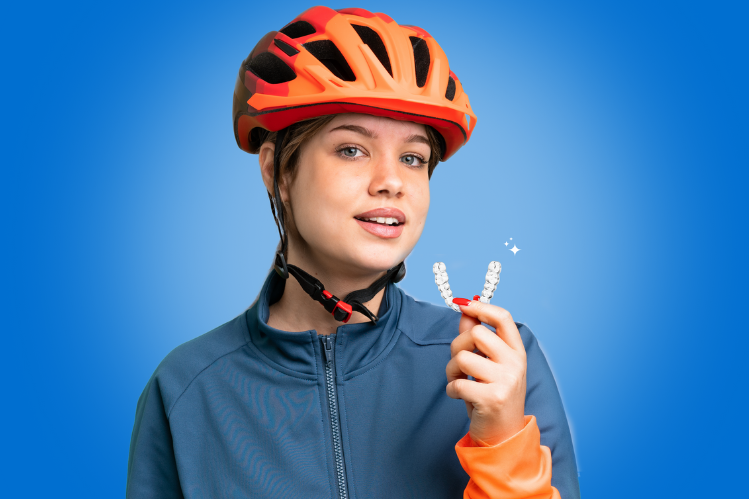
Table of Contents
- Why People Choose Clear Aligners for Sports?
- Understanding the Relationship Between Sports and Aligner Safety
- Common Scenarios of Aligner Damage During Sports
- Emergency Steps for Broken Aligners
- First Steps:
- Potential Scenarios and Solutions
- Aligner Damage Prevention: Tips for Athletes
- ALIGNERCO Storage Case: Your Game-Time Aligner Protection Solution
- Why Choose ALIGNERCO?
- FAQs
Clear aligners have revolutionized orthodontics, offering a nearly invisible and practical alternative to traditional braces. However, clear aligners are still vulnerable despite their discreet appearance, especially during physical activity. For instance, many sports lovers who wear aligners often ask what happens if you break your aligners while playing sports, what to do in emergencies after damage occurs, and most importantly, how to prevent it in the first place.
In this comprehensive guide, we will cover everything related to aligner damage during sports. Learn how to fix broken aligners during sports and take steps to avoid future mishaps.
Why People Choose Clear Aligners for Sports?

Clear aligners have emerged as a preferred orthodontic solution, particularly among athletes, thanks to their exceptional versatility and convenience. Unlike traditional metal braces that are permanently fixed, clear aligners can be easily removed, allowing greater flexibility during physical activities and daily routines.
This means athletes can take them out before eating, drinking, or engaging in sports activities—something that’s not possible with metal braces. This removable feature allows for a more comfortable and flexible lifestyle, letting wearers enjoy their daily routines and sports without constant concern.
Traditional braces, with their metal brackets and wires, can be uncomfortable and even hazardous in sports like football or hockey. These metal components can cause injuries inside the mouth if a player is hit or falls. In contrast, clear aligners are made from smooth, BPA-free plastic that is less likely to cause injury.
They’re also far more resistant to breaking or bending under pressure. While metal braces can snap or become dislodged during intense activity, clear aligners reduce the risk, offering both practicality and peace of mind.
Understanding the Relationship between Sports and Aligner Safety
Although clear aligners are made from medical-grade plastic that’s strong enough for daily use, they aren’t unbreakable. Athletes in various sports—especially contact sports like football, basketball, or martial arts—must be cautious.
Why Sports Pose a Risk to Aligners?
- Impact to the Face: A direct blow can dislodge or crack the aligner.
- Falling or Colliding: Unexpected impacts can place uneven force on your aligner, causing damage.
- Teeth Grinding or Clenching: Many athletes grind their teeth or clench their jaws during tense moments, which can wear down or weaken the aligners.
Aligners and Physical Activity: Is It Safe?
Yes, but with limitations. Light exercises such as walking, jogging, or yoga generally don’t pose a risk, and aligners can stay in. However, for high-intensity or contact-heavy sports, it's recommended to either remove clear aligners beforehand or take extra safety measures to prevent damage or injury.
Common Scenarios of Aligner Damage during Sports
Learning from actual cases helps prepare you for similar situations:
- Football Collision: A high school athlete was tackled during a game and took a helmet to the jaw. The force cracked his aligners straight down the middle.
- Gymnast's Slip: While practicing on a balance beam, a gymnast slipped and hit her chin on the beam, chipping her upper aligner.
- Martial Arts Accident: A young adult received an unexpected kick to the face during sparring. The impact left a visible crack on one side of his aligner.
These incidents serve as a reminder that even durable materials like aligners have their limits. Being aware of such scenarios helps in taking the right preventive steps.
Emergency Steps for Broken Aligners
Your clear aligner journey is a structured treatment plan, using a series of custom-made aligners designed to shift your teeth into alignment gradually. However, accidents happen, and knowing how to respond is essential.
First Steps:
1. Contact Your Orthodontist
As soon as you realize your aligners are missing or damaged, reach out. Prompt communication helps keep your treatment on track.
2. Provide Details to Your Orthodontist
When contacting your orthodontist, share clear and specific details about your issue, such as discomfort, broken aligners, or unexpected tooth movement, to help them assess and respond effectively.
3. Orthodontic Assessment
Your orthodontist may ask for additional details or schedule a visit to examine the damage and determine the next step.
Potential Scenarios and Solutions
Lost Aligners
An orthodontist will evaluate your current treatment plan stage if your aligners are lost. They might advise switching to the next set or, in certain situations, temporarily going back to the last set.
Damaged Aligners
An orthodontist will assess the extent of the damage to the aligners. You can be told to keep wearing the damaged set until the next planned change if the damage is not too severe. However, severe damage can force you to advance to the next set sooner.
Orthodontist Recommendation
Based on the evaluation, an orthodontist will offer detailed recommendations. This could entail ordering new aligners in exceptional circumstances, switching to the next set, or continuing with the existing set.
Refinement Stage
An orthodontist may try to proceed to the refining stage earlier if the loss or damage happens close to the conclusion of a set of aligners. To attain the best outcomes and fine-tune the tooth motions, refinement entails using extra sets of aligners.
Aligner Damage Prevention: Tips for Athletes
Athletes don’t need to pause their clear aligner treatment—they just need to play it smart. Here are the tips for protecting aligners during sports.
Remove Aligners during High-Impact Sports
Activities like rugby, football, or boxing carry a high risk of oral trauma. It’s safer to remove your aligners and wear a protective athletic mouthguard during these activities.
Store Aligners Properly
Always carry a case for your aligners. If you remove them, store them securely. Never wrap them in napkins—they could be mistaken for trash, or leave them exposed where they can get lost or broken.
Avoid Sugary or Acidic Beverages
Sports drinks, sodas, and even coffee can damage your aligners or stain them. Always remove aligners before drinking anything other than water, and rinse your mouth before reinserting them.
Maintain Oral Hygiene
After playing sports, brush and floss your teeth before reinserting aligners. This prevents bacteria buildup and keeps both your teeth and your aligners clean. Keep a travel toothbrush and floss in your sports bag.
Clean Aligners Regularly
After workouts or games, clean your aligners using lukewarm water and a soft brush—skip the toothpaste, as it can scratch the plastic. Clear aligners, cleaning crystals, or gentle denture cleaners work well for deep cleaning.
Regular Check-Up
Routine visits can catch micro-cracks or damage early.
Invest in Backup Aligners (If Offered)
Some providers offer backup aligners for emergencies—ask your orthodontist.
ALIGNERCO Storage Case: Your Game-Time Aligner Protection Solution

Keep your clear aligners safe, clean, and well-protected with the ALIGNERCO Storage Case . Thoughtfully designed for both convenience and portability, this compact case is a must-have for everyday use and travel. Whether heading to the gym, enjoying a night out, or getting ready for a trip, this sturdy little case fits perfectly in your handbag, gym bag, or even your makeup pouch. Its sleek, durable design helps shield your aligners from dirt, damage, and accidental loss.
Key Features:
- Compact & Lightweight: Easy to carry, whether you're at home or on the move.
- Hygienic Storage: Keeps your aligners clean and protected.
- Durable Construction: Designed to handle accidental drops.
- Travel-Friendly: Small enough to slip into bags, pockets, or kits.
- Extra Convenience: Great to keep a spare case at work, school, or in your car.
Why Choose ALIGNERCO?
In orthodontic care, ALIGNERCO is unique and provides a combination of accessibility, affordability, and convenience. Here’s why ALIGNERCO is a great choice:
Orthodontist-Approved Precision
A team of expert technicians designs your treatment plan, and a licensed orthodontist reviews it to ensure optimal results.
Cutting-Edge Technology
Our cutting-edge 3D technology speeds up your path to a straighter smile. Most people achieve their perfect smile in just 4 to 6 months.
Affordable Aligners
Get up to 40% lower costs than other invisible aligners, or 60% less than traditional braces.
Responsive Customer Support
We provide round-the-clock support to help you anytime during your aligner process and make your aligner experience as smooth as possible.
FSA/HSA Eligibility
Maximize your flexible or health savings account to invest in your dream smile.
Smile Assessment-Driven Care
We start treatment by thoroughly examining your present smile and how we could mold it into the smile of your dreams.
AlignerTracker App
Use our AlignerTracker App to keep track of your teeth moves, get care reminders from our smile experts, and see how your progress is going.
Protect Your Smile on and off the Field
Clear aligners and an active lifestyle can go hand in hand, with the right precautions. From avoiding cracks during contact sports to knowing what to do if your aligners break, being prepared makes all the difference. Always remove aligners during high-impact games and store them safely to avoid costly setbacks.
One simple solution? Use the ALIGNERCO Aligner Case—a compact, durable storage box that keeps your aligners safe, clean, and easy to find. Whether you're on the field or at the gym, it’s your go-to for aligner protection.
FAQs
1. How to fix a broken aligner?
Don’t attempt to fix it yourself. Contact your provider immediately for a replacement or advice.
2. Can I play sports with my clear aligner?
Yes, but it's safer to remove them and store them in a protective case during contact sports.
3. Can I still wear a cracked aligner?
If the crack is small and fits snugly, you may wear it temporarily. Contact your provider as soon as possible.
4. What is the biggest complaint with clear aligners?
Common concerns include discomfort or tightness when switching trays, and aligners cracking or staining.
Citations:
Barile, F., Ricciardi, D., Gatto, R., & Barone, A. (2024). Fracture resistance and failure modes of clear aligners under mechanical stress. Journal of Orthodontic Science, 13(2), 123–129. https://doi.org/10.5005/jos-2024-1234
Kim, T. W., & Echarri, P. (2007). Clear aligner therapy. Progress in Orthodontics, 8(1), 41–66. https://doi.org/10.1016/j.pio.2007.04.001
Fang, D., Li, F., & Chen, J. (2020). Surface roughness and structural degradation of clear aligners after use: An in vitro study. The Angle Orthodontist, 90(6), 870–875. https://doi.org/10.2319/012320-92.1
Lümkemann, N., Eichberger, M., Stawarczyk, B., & Roos, M. (2023). Dimensional stability of different clear aligner manufacturing techniques. Clinical Oral Investigations, 27(1), 235–243. https://doi.org/10.1007/s00784-022-04720-3
Robertson, L., Kaur, H., Fagundes, N. C. F., Romanyk, D., Major, P., & Flores-Mir, C. (2019). Effectiveness of clear aligner therapy for orthodontic treatment: A systematic review. Orthodontics & Craniofacial Research, 22(3), 133–142. https://doi.org/10.1111/ocr.12292
Liu, Y., Jiang, H., & Wang, X. (2022). Effects of clear aligner wear on oral health and orthodontic outcomes: A clinical review. International Journal of Dental Research, 14(2), 90–97. https://doi.org/10.15587/1729-4061.2022.258395
Odonto Aligners. (2024). How to prevent aligner damage during contact sports. https://www.odontoaligners.com/safety-aligners-sports
American Association of Orthodontists (AAO). (2022). Mouthguard safety tips for athletes with orthodontics. https://www.aaoinfo.org/blog/athletes-orthodontics-mouthguards/





